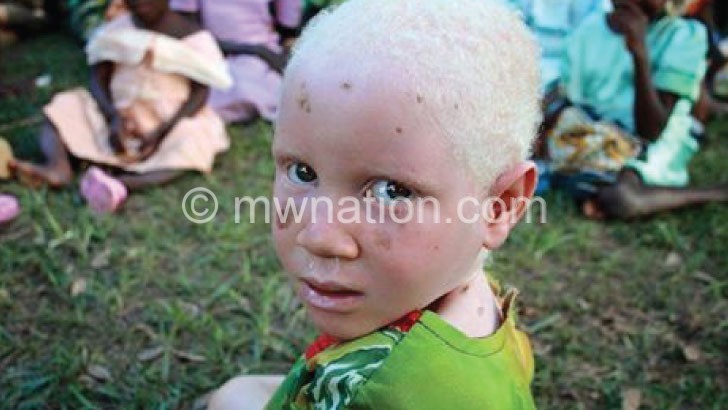‘We are still in danger’
They are not animals to be hunted, but they are murdered, scorned, threatened and captured because of a skin-deep condition.
People with albinism in Malawi are being waylaid like game in horrid attacks fuelled by a superstition that their parts can bring good luck and wealth.
President Peter Mutharika termed the belief “stupid and absurd”, but the ritual killings persist.

Madalitso Lemani, from Chaziya Village in Kasungu, wants an end to the spate, which cost the life of her two-year-old baby in April 2016.
The 28-year-old is grappling to come to terms with the abduction and murder of the baby who was sleeping by her side when she dozed off.
She explains: “When I went to sleep, my two children were around. Everything was normal up to around 4am when I woke up only to find the younger one was not here.
“I alerted my mother about the disappearance, and we reported the matter to police. They asked if I suspected anyone and I could only think of the baby’s father because he had hinted on killing the child before. He told me that there was a market in Lilongwe, but I told him off,” she recalls.
No one to trust
Lemani’s husband was among five suspects arrested in connection with the killing. Two weeks later, one of the murder suspects bolted from prison.
The runaway suspect allegedly returned to the remote village in Traditional Authority (T/A) Kapelula to exhume the remains of the child.
He took them to Nkhotakota, where a herbalist, who was sounded out to buy the human parts, took them to a police station.
“The man was arrested only to learn later that it was the same murder suspect who had escaped from Kasungu,” says Lemani.
Also on the wanted list is her son, who is on the run.
Lemani fears for her life because she too has albinism, a rare genetic condition that causes the skin, hair or eyes to have little or no colour.
“The rest of them are still on remand, but we have no idea why he was released when the case is still in court. It is my prayer that authorities will investigate the circumstances that led to his release. Only then would my heart be at ease. We are living dangerously. After the arrest, they may have plotted to kill me first. What if he still thinks of committing the act?” she asks.
In the country, people with albinism live in fear due to persistent killings, abductions and other attacks that often involve people who are supposed to protect them.
Climate of fear
The country was shocked with the killing of Yasin Kwenda Phiri, 54, in Kande, Nkhata Bay last week.
The man was killed by unknown assailants in the presence of his son, aged 9.
This is the 15th murder since the start of the attacks in November 2014, according to police. The police have recorded 148 cases so far. However, Amnesty International says 21 people have been murdered in the spate.
The international human rights defenders ask government to revamp the criminal justice system to protect the endangered minority as the majority of the crimes remain unresolved and unpunished.
Centre for Human Rights and Rehabilitation (CHRR) senior advocacy coordinator Michael Kaiyatsa asks authorities to ensure perpetrators are brought to book.
“More resources should be allocated in prosecuting the cases of violence against people with albinism. There are many cases in which people have been killed or abducted, but the perpetrators have been left scot free,” he said.
He reckons the country’s justice system is wanting as the courts have only completed three percent of the cases.
“This sends a wrong message to the perpetrators. They think that they can commit the crime and get away with it,” he said.
People with albinism are living in danger due to continued rights violations.
Lurking enemies
Two months ago, a woman in Chikwawa was also attacked by assailants who broke into her house while she was sleeping. Fortunately, the woman’s neighbours came to her rescue after hearing her cry for help.
“This is a signal that the threat is still there for people living with albinism. There are still people who are looking for ways to attack them,” states Kaiyatsa.
The human rights defender expressed the need to strengthen community structures responsible for responding to such attacks, including community policing.
Association of People with Albinism in Malawi (Apam) president Overstone Kondowe called for serious law enforcement to protect lives and ensure perpetrators face punishment.
But national police spokesperson James Kadadzera says the law enforcers are doing their part to end the killings and abductions.
“We have created awareness in the communities to demystify albinism. We have been sensitising people that nobody got rich by selling body parts of a person with albinism. As such, the abductions and murders have gone down,” he says.
Kadadzera commended the courts for jailing some perpetrators.
Malawi is party to the African Charter on Human and People’s Rights and the International Covenant on Civil and Political Rights.
The international treaties obligate government to protect, promote and fulfill the right to life, dignity, personal security and safety for all people, including vulnerable groups such as people with albinism. n





